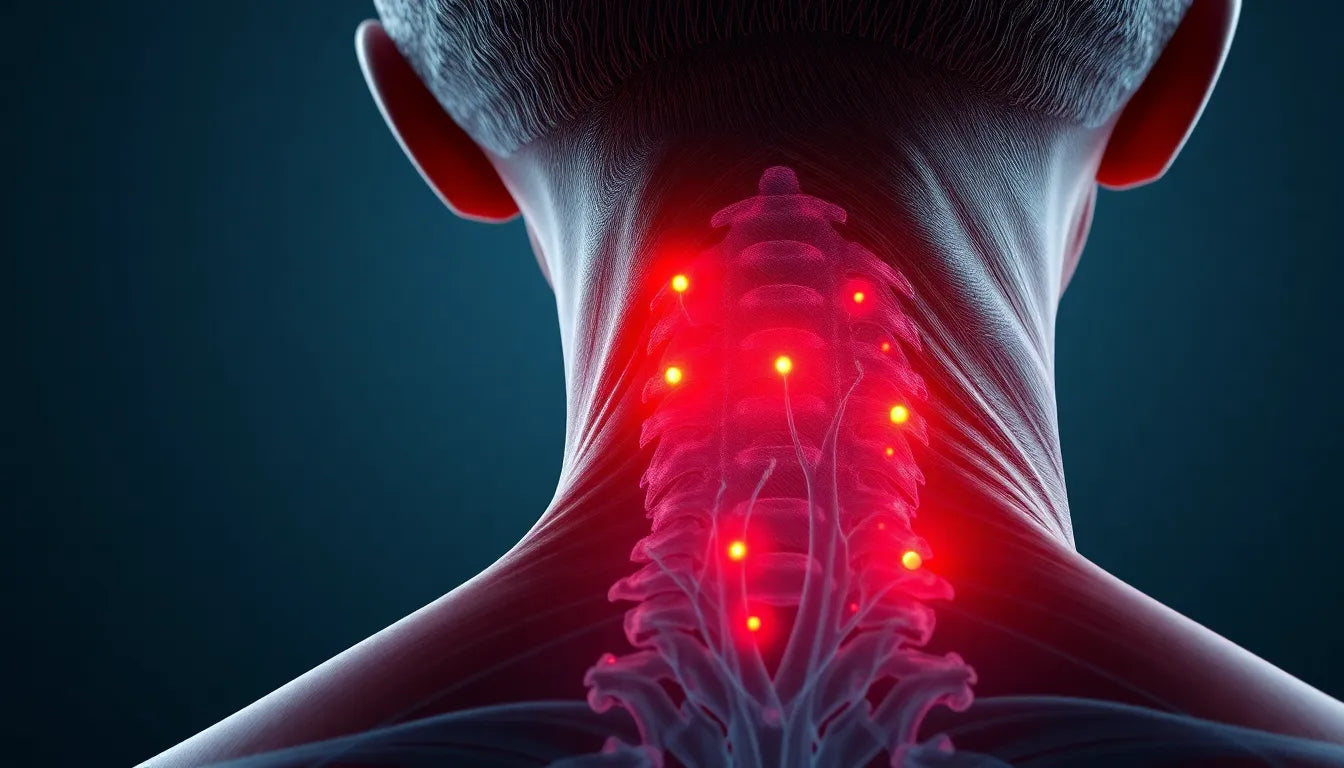Dealing with a herniated disc in the neck, also known as cervical disc herniation, can be a daunting challenge, especially when it comes to getting a good night's sleep. The discomfort and pain associated with this condition often disrupt sleep, making recovery and daily functioning difficult. Sleep is not just a time for rest; it plays a crucial role in recovery and pain management, particularly for those suffering from neck issues. This blog post aims to provide expert-backed strategies to help you sleep more comfortably, even with a herniated disc in your neck.
understanding the challenge of sleeping with a herniated disc in the neck
Cervical disc herniation occurs when one of the discs in the neck area protrudes out of its normal boundary, often pressing on nearby nerves. This can lead to significant pain, stiffness, and discomfort, all of which can severely impact sleep quality. The pain may not only make it difficult to fall asleep but can also cause frequent awakenings throughout the night, leading to a cycle of sleep deprivation and increased pain sensitivity.
Proper sleep is essential for everyone, but for those with a herniated disc in the neck, it becomes even more critical. Quality sleep supports the body's natural healing processes, reduces inflammation, and helps manage pain levels. Without adequate rest, the symptoms of a herniated disc can worsen, further decreasing the quality of life.
the importance of sleep in pain management
Quality sleep is a powerful tool in the management of pain associated with a herniated disc. When we sleep, our bodies undergo various restorative processes that help repair tissues and reduce inflammation. For individuals with neck pain, achieving a restful night can significantly alleviate symptoms, leading to improved mood and increased energy levels during the day.
However, those suffering from a herniated disc in the neck often face common struggles such as finding a comfortable sleeping position and dealing with discomfort that leads to frequent waking. These challenges highlight the need for targeted strategies to enhance sleep quality. By focusing on proper alignment and support during sleep, individuals can find relief and promote healing.
In the following sections, we will explore various expert-recommended sleeping positions and tips that can help you manage neck pain and improve your sleep quality. Whether it's adjusting your sleeping posture or choosing the right pillow, these strategies are designed to help you wake up feeling more refreshed and less in pain.
best sleeping positions for cervical herniated discs
Finding the right sleeping position is crucial for those suffering from a herniated disc in the neck. The proper posture can significantly reduce discomfort and promote better sleep quality, aiding in recovery. Here's a detailed look at some of the best sleeping positions recommended by experts:
back sleeping (supine position)
Sleeping on your back is often considered the best position for maintaining spinal alignment. This position helps distribute weight evenly and minimizes pressure on the cervical spine. To enhance comfort, it's advisable to use a thin pillow under your head to keep the neck in a neutral position. Additionally, placing a pillow under your knees can help maintain the natural curve of the spine, offering extra support and reducing strain.
side sleeping
Side sleeping is another recommended position for those with a cervical herniated disc. It's vital to ensure that your neck is aligned with your spine, which can be achieved by using a thicker pillow that fills the space between your neck and the mattress. To further enhance spinal alignment, place a pillow between your knees. For additional support, a rolled-up towel at your waist can help maintain a neutral spine position, reducing the risk of aggravating neck pain.
fetal position
The fetal position, where you lie on your side with your knees drawn towards your chest, can provide comfort by opening up the spaces between vertebrae and reducing spinal stress. This position is often reported as soothing for many individuals with herniated discs. However, it may not be suitable for everyone, so it's important to listen to your body and adjust as needed.
reclined/semi-upright position
For some individuals, sleeping in a reclined or semi-upright position can alleviate pressure on the neck and reduce nerve compression. This position is particularly beneficial for those experiencing cervical radiculopathy. Using an adjustable bed or a wedge pillow can help achieve this posture, offering relief and comfort during sleep.
stomach sleeping
Stomach sleeping is generally discouraged for individuals with a herniated disc in the neck, as it can strain the spine and neck. However, if this position is unavoidable, placing a pillow under the pelvis and hips can help reduce spinal extension and mitigate some of the strain.
key factors for optimal sleep with a herniated disc in the neck
Beyond choosing the right sleeping position, there are several other factors to consider for achieving optimal sleep with a herniated disc in the neck:
spinal alignment
Maintaining the natural curve of your spine and neck is crucial for reducing the risk of nerve compression and pain. Proper alignment not only aids in pain relief but also supports the body's healing processes during sleep.
pillow selection
The choice of pillow is essential in preventing additional neck strain. A supportive pillow that is not overly thick can help keep your neck aligned with your spine. Memory foam or cervical pillows are often recommended as they contour to the shape of your neck, providing customized support.
customization based on pain site
The advice for sleeping positions and pillow selection may vary depending on the specific location of the herniation. For cervical herniations, prioritizing neck support and head elevation is crucial to alleviate discomfort and promote restful sleep.
Incorporating these strategies into your nightly routine can make a significant difference in managing neck pain and improving sleep quality. By focusing on proper alignment and support, you can find relief and wake up feeling more refreshed and less in pain.
additional sleep tips and lifestyle considerations
Improving sleep comfort for individuals with a herniated disc in the neck extends beyond the bedroom. Here are some lifestyle adjustments and tips that can contribute to better sleep quality and overall well-being:
ergonomics beyond sleep
Maintaining good posture throughout the day is crucial for managing neck pain. Be mindful of your sitting posture, ensuring your back is supported and your head is aligned with your spine. Avoid forward head posture, which can exacerbate neck strain. Consider ergonomic chairs and desks if you spend long hours sitting, as they can help maintain proper alignment and reduce discomfort.
when to seek professional help
If you find that conservative measures and home remedies do not alleviate your neck pain, it may be time to consult a spine specialist. Persistent pain, numbness, or weakness in the arms or hands could indicate the need for professional evaluation. Treatments such as physical therapy or, in some cases, surgical options may be recommended to address the underlying issues and improve your quality of life.
comparison table: sleep positions for herniated disc in neck
| Position | Benefits | Drawbacks/Notes |
|---|---|---|
| Back (Supine) | Maintains spinal alignment, reduces neck pain, optionally supports under knees | Requires correct pillow height |
| Side | Keeps neck aligned (with thick/supportive pillow), pillow between knees aids alignment | Without proper support, can misalign neck |
| Fetal | Reduces spinal stress, opens joints | May not be comfortable for all |
| Reclined/Semi-upright | Reduces nerve pressure, good for radiculopathy | Needs adjustable bed/wedge pillow |
| Stomach | Generally not recommended, but mitigated by pillow under hips | Can strain neck/spine |
frequently asked questions
what is the best sleeping position for a herniated disc in the neck?
The best sleeping position for a herniated disc in the neck is typically on your back (supine position) with a thin pillow under your head and an optional pillow under your knees to maintain spinal alignment. Side sleeping with a supportive pillow for neck alignment is also recommended.
how can I reduce neck pain while sleeping?
To reduce neck pain while sleeping, ensure you maintain proper spinal alignment with the right pillow and sleeping position. Choose a supportive pillow, avoid stomach sleeping, and practice good ergonomics throughout the day.
when should I seek medical advice for a herniated disc in the neck?
Seek medical advice if you experience persistent pain, numbness, or weakness in the arms or hands, or if home remedies fail to alleviate the pain. A spine specialist can offer further evaluation and treatment options.
are there specific pillows recommended for cervical herniated discs?
Memory foam or cervical pillows are often recommended for cervical herniated discs as they contour to the shape of your neck, providing customized support. Ensure the pillow is not too thick to prevent additional neck strain.
can lifestyle changes improve sleep quality with a herniated disc?
Yes, lifestyle changes such as maintaining good posture, using ergonomic furniture, and practicing relaxation techniques can improve sleep quality for those with a herniated disc. These adjustments help reduce neck strain and promote overall comfort.
Sources
- New York Spine Institute. "Sleeping with a Herniated Disc."
- Pain and Spine Specialists. "Best Sleeping Position for Herniated Discs."
- STL Pain Consultants. "Tips to Stop Herniated Disc Pain when Sleeping and Sitting."
- Florida Surgery Consultants. "How to Sleep With a Herniated Disc."
- Pain and Spine Institute. "How To Sleep With a Herniated Disc."
- Cuellar Spine. "Sleeping Tips for Cervical Radiculopathy."
- NY Bone & Joint. "The Best Ways to Sit and Sleep If You Have a Herniated Disc."


















